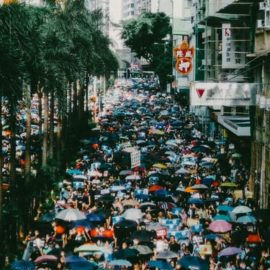

This article is an excerpt from the Shortform book guide to "Thank You for Being Late" by Thomas L. Friedman. Shortform has the world's best summaries and analyses of books you should be reading.
Like this article? Sign up for a free trial here .
Why is the United States considered a superpower? What role does America play in the world?
The United States is a superpower, which means the country is a major player in the maintenance of global stability and disaster assistance. Organizations such as the United Nations are important, but the U.S. is the lynchpin of global stability, particularly since the EU has been weakening in recent years. The entire world’s stability relies on the stability of the US’s economy, military, and democracy.
In this article, we’ll discuss America’s role in the world and its implications for its foreign policy.
The Global Importance of the US
Being a global superpower and a democracy, America’s role in the world is more significant than that of any other single country. Russia and China don’t have to deal with breakers and disorder the same way that the US does because they’re authoritarian states—they have a high degree of control over their citizens and immigration.
For example, when the Ebola virus, which could have affected the whole globe, broke out, it was the US, not China or Russia, who dealt with it. The US sent troops to Africa to contain the spread and spent $3 billion eradicating the virus.
US Foreign Policy
US foreign policy used to be easy—contain one other superpower, Russia—but in the age of accelerations it’s far more complicated and has three major arms:
Arm #1: Manage Superpowers
Today, there are three superpowers, the US, Russia, and China, and dealings with superpowers are no longer simply about containment and recruiting allies. The world is so interconnected now that the fall of other superpowers might actually be more dangerous for the US than the rise, and allies can quickly become enemies.
- Example #1: China has a huge effect on the world’s economy. If China collapsed, there could be a global recession.
- Example #2: The EU is an American ally regarding democratic capitalism and helps the US stabilize the globe. However, when member nations such as Great Britain cause instability (Brexit), that instability might have a larger effect on the EU (and therefore the US) than any attack China or Russia could launch.
Arm #2: Stabilize the Globe
In addition to superpowers, US foreign policy must manage state failure, which is the fall of governments and the takeover of countries by tribes, gangs, and extremist groups. Weak states in the Middle East and Africa are causing regions of disorder, and this disorder is spilling into more stable nations as migrants and refugees travel from weak states to Europe or the US.
- For example, thousands of young male migrants from various parts of Africa, which is disordered, meet in Agadez, Niger. On Monday evenings, they pile into trucks to travel through Libya (which is war-ravaged) and hopefully on to Europe, a more ordered part of the world, to find jobs. Neither Libya nor Europe wants to let most of the migrants in.
Arm #3: Contain Breakers
The final arm US foreign policy must address is containing breakers. Breakers are individuals or groups who want to cause chaos. (Friedman contrasts breakers with “makers,” people who use the accelerations to build new things or improve old things.)
Pre-acceleration, new technologies were first available to governments and it took some time for them to make their way into the hands of the general public, but now, it’s easy to get destructive technology or find out how to build it online. A single person now has the ability to compete with superpowers and unlike superpowers, breakers often can’t be deterred by mutually assured destruction—some breakers are happy to commit suicide if it means hurting others too.
- Example #1: It’s now easy to source inexpensive bomb-making materials online. It only costs $100 to make an IED, a simple bomb. As of 2013, IEDs killed over 3,000 Americans in Afghanistan and Iraq, and the US government spent $75 billion on anti-IED measures.
- Example #2: In 2016, cybercriminals took over the computers in a hospital in LA and blackmailed the hospital into paying them in order to get their computers back. Pre-acceleration, it was easy to catch extorters—put a tracker in the bag of ransom money. These hospital cybercriminals, however, asked to be paid in bitcoin, which is hard to trace. (Shortform note: As of 2020, the criminals were still at large.)
Additionally, single breakers are far harder to identify, predict, and take down than an organization. When a government is dealing with a terrorist organization, the strategy is to find the organization, disrupt it, and destroy it. Individual people are harder to keep track of and they can come out of nowhere. The rise of breakers is part of why radical Islamism is so persistent—it’s not an organization, it’s a movement. There’s no leadership structure, so taking out certain people doesn’t have a major effect on the movement.

———End of Preview———
Like what you just read? Read the rest of the world's best book summary and analysis of Thomas L. Friedman's "Thank You for Being Late" at Shortform .
Here's what you'll find in our full Thank You for Being Late summary :
- The problems that arise when the world changes faster than humanity can adapt
- How to adapt to technology, globalization, and climate change
- The importance of taking time to reflect and reorient






